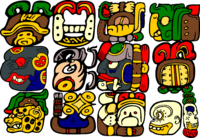Twelve Great Enterprises
The Twelve Great Enterprises (Mutli: లకహ లకమ భె, Lakah Lakam B'e) were trade companies each created by one Mutuleses lineages during the 16th century. The last ones were dissolved in 1841 in the wake of the Arthuristan Ultimatum and the abandon of the last trade ports by the Divine Throne, officially ending the Mutulese Global Circuit.
While at first competing with one another for the profitable trades with Ochran and the Ozeros oceans, the Kirishtan Uprising and the War for Kahei led to the Enterprises forming a de-facto Cartel controlling and regulating trade between Oxidentale, Ochran, and Malaio.
This Cartel would end up facing competing interests from the Latins (Kirishtan Uprising, War for Kahei, First Shamabalese Great War) but also from other trans-oceanic power such as the Zacapitec (Red Sails Wars) or from local powers fighting against the growing Mutulese presence and influence (Green Horde, Vardana, Kembesa, Iifae Imamates...). The Enterprises would reach their Golden Age during the first half of the 18th century where they dominated the Mutulese Global Circuit until the establishment of the First Republic of Tsurushima in 1750 began a cycle of tensions and conflicts between the Tsurushimeses and the Mutuleses that would prove fatal to the Circuit.
The Great Enterprises were the economic pillar of Mutulese Imperialism and the backbone of the world largest colonial empire. Through these corporations the Mutul would refine and export concepts and procedures that remain central to the modern capitalist economy: Multinational limited companies emitting shares and bonds within a worldwide open market with only limited influence from state entities.
